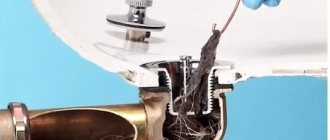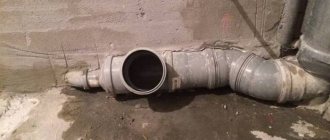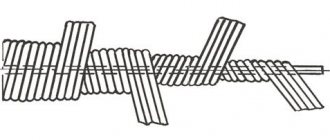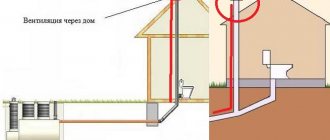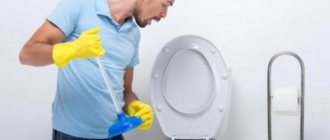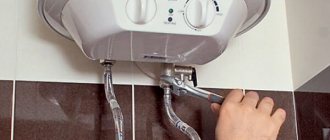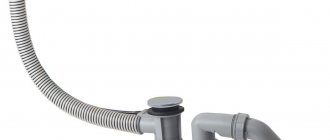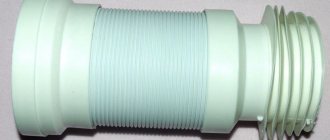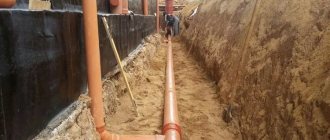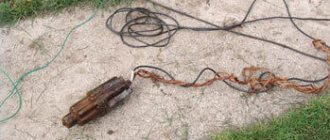Why do blockages occur?
The need to clean the drain hole appears when a dense plug forms from hair, small debris, pet hair, threads, pieces of soap, or pellets. The phenomenon may have one of three causes:
- operational – caused by neglect of regular prevention;
- mechanical – a lot of debris particles come with water;
- man-made - the sewer system was assembled incorrectly, there is deformation of components, wear and tear of equipment.
If the outflow is weak, before cleaning the drain, you need to make sure that the cross-section of the pipe and its slope are appropriate for the purpose.
Often, to solve the problem, it is enough to increase the slope of the drain channel by raising the bathtub or moving the sewer bell down.
Cleaning the siphon device
Stagnation of water, accompanied by the appearance of a characteristic unpleasant odor, may indicate that a plug has formed in the walls of the siphon. This structural element performs two tasks at once: it prevents the penetration of sewer odors and protects the system from the ingress of foreign objects.
If you accidentally dropped a small but valuable item down the drain, there is a high probability that it will settle in the siphon; removing it is not difficult by disassembling and cleaning the device
Before disassembling the siphon, directly under its location it is necessary to spread a piece of old cotton fabric that absorbs moisture well.
Cleaning the siphon is performed in the following sequence:
- A container with low sides is installed under the location of the siphon, into which liquid from the disassembled structure will drain.
- Unscrew the shutter nut and disconnect the flask from the outgoing pipe.
- The water, which served as a water seal, is drained from the flask.
- The bottom of the siphon is unscrewed and cleared of accumulated deposits by wiping the surface from the inside with a sponge and washing it with a stream of water.
- The flask is installed in its original place, docking with the outgoing pipe.
- Open the tap so that water fills the water seal and check the integrity of the connections.
When assembling the structure and installing the flask in its original place, it is important to place it in such a way that the drain pipe does not rest on it. If you do not adhere to this requirement, the water seal will be broken when starting the system. As a result, a persistent sewer smell will appear, which is quite difficult to get rid of in a short time.
When cleaning the inner walls of a disassembled siphon, you need to not only wash out the dirt lumps, but also remove the deposits that have formed on the walls
Lumps of garbage removed from the siphon should not be flushed down the drain so as not to clog the system. They are best disposed of as household waste.
Drain Maintenance Methods
Methods for cleaning bathroom drains that are available for you to do yourself are divided into 2 categories:
- mechanical,
- chemical.
The first are carried out using tools such as a plunger, cable, or vacuum cleaner. The effectiveness of their use depends on the degree of blockage and a skillful approach. A wide range of chemical products are offered in the departments of household cleaning products, but you don’t have to buy them - ordinary ingredients from the kitchen will help dissolve hair.
How to prevent hair from getting caught
Preventing the drain from clogging with hair is the main task of the housewife. The first protective measure is to install a mesh over the drain hole, which will trap hair and prevent it from getting into the pipe. A special device for catching and removing hair, which is sold complete with siphons, will also help to maintain the cleanliness of the bathtub.
Preventive measures include the already mentioned plunger and gels/powders to dissolve debris. But do not overuse the products so as not to damage the pipes.
The cleanliness of the bath is in your hands. Do not ignore the first signs of a blockage: you will be more comfortable taking water procedures in a clean bath with quick drainage of used water.
Features of the mechanical method
Before you clean the bathroom drain from hair with a plunger, you need to fill the bowl with a little water to a level that hides the rubber suction cup tip of the tool. The plunger is installed over the sewer hole and the handle is pressed sharply and vigorously so that the plug moves into the drainage cavity.
In more advanced cases, when using a plunger fails to achieve the expected result, a plumbing cable will help - it looks like a flexible steel chain, the end of which is shaped like a brush or a ribbed spiral. The tool quickly reaches hard-to-reach areas, eliminating dirt that accumulates on the walls and blockages. Guide to action:
- Carefully place the cable into the drain cavity.
- Using rotational and translational movements, guide the cable to the point of suspected blockage.
- Move the cable back and forth several times to pick up dirt from the hair, remove the tool from the pipe and rinse it.
- Introduce clean water into the system by opening the tap.
Plastic communications are quite fragile, they are not suitable for intensive mechanical processing, so care must be taken.
If the household has a vacuum cleaner with a reverse blowing option, to clear the drain of hair, you can remove the rubber nozzle from the plunger and connect it to the pipe of the device, securing the joint with electrical tape. You need to remove the dust bag/container from the vacuum cleaner. The converted hose with pipe should be attached to the blowout hole, bring the tip to the drain and turn on the device. Supplying pressurized air into the drain helps push out the clog.
Mechanical drain cleaning method
Calling a professional with special equipment gives access to such an effective method as hydrodynamic cleaning: superheated steam is supplied into the cavity under high pressure. As a result, even persistent contaminants are destroyed, but the method is not applicable to old and fragile communications, or those with a non-standard configuration.
How to clean pipes at home
A plunger is a special household tool that is used when utility lines are clogged. If a section of the sewer system is clogged, it is important to remember the basic rules for using this device.
- A small amount of water should be left near the drain hole.
- Press the plunger firmly onto the surface of the bathtub at the drainage point. You need to make sure that air does not get under the rubber bowl.
- Perform several vigorous up-and-down movements with the wooden handle, and then jerk the tool away.
- If the result is not obvious and the water does not go away, the procedure is repeated.
- When everything works out, open the hot water tap and rinse the pipes with it.
You should use a plunger regularly for preventive purposes. The frequently repeated process of pushing out small clumps of dirt that are already inside will prevent them from accumulating into larger masses.
Caution : the instruction manual for acrylic bathtubs does not allow the use of this improvised product, as the tightness of the drain may be compromised.
Another mechanical device that allows you to remove accumulated debris from a pipe is a plumbing cable.
- To successfully clear the blockage, you need to insert the rope into the drain hole and begin to push it forward until it comes into contact with the problem area of the sewer.
- The goal of further actions is to destroy the “plug” or “pick it up” and extract it to the surface. To do this, you need to break through the obstacle, making reciprocating movements with the cable and at the same time rotating it around its axis (this combination of techniques is possible using a special handle).
- At the same time, hot water poured into the hole will speed up the process of removing the blockage.
- If you feel that the movements of the cable inside are becoming more free, you need to slowly remove the cable from the pipe and check whether you managed to do what you intended: whether the water is now draining.
Important : when purchasing a device, you must take into account the diameter of its cross section. The thickness of flexible cables offered on the market today varies from 6 to 28 mm. Ropes that are too thin are not effective for removing large blockages, while thicker and, therefore, massive ropes can damage small pipes.
Products for dissolving hair in drains
When choosing concentrated chemical compounds that help clean the bathtub pipe and dissolve hair, you need to focus on the material from which the communications are assembled. There are pipes:
- polyethylene,
- polyvinyl chloride,
- fiberglass,
- ceramic,
- asbestos-cement,
- polypropylene.
All manipulations with gels, powders and acids should be carried out with safety glasses and thick rubber gloves; after achieving the result, it is important to properly ventilate the bathroom. The dissolution of soap scum and hair can be trusted with acidic cleaners, and fatty deposits with alkaline cleaners.
Professional solutions
Review of popular industrial compounds:
- "Mole" contains sodium hydroxide, modified acetic acid, and surfactants. This is a budget-friendly, ubiquitous tool. The expected effect is observed after 1.5-2 hours;
- "Chirton - clean drains" has a granular form, the active ingredients are sodium nitrate, caustic soda. The product has a moderate odor and takes effect within a quarter of an hour;
- “Sanox – pure drain” contains sodium hydroxide, it interacts with atmospheric surfactants. The product has no restrictions on the type of pipes and is characterized by a slight odor that does not cause discomfort. The only drawback is the need to wait at least 1 hour to obtain the required result;
- in Bagi Pothan, the working components are also surfactants and caustic soda; this is a highly toxic composition and cannot be used on old pipes. The product eliminates the blockage in just a few minutes, it is very caustic, so it is used only in extreme cases;
- "Deboucher" in gel form operates due to sodium hydroxide, chlorine, potassium in tandem with active additives. It is characterized by high efficiency, its operating cycle is 1 hour. The product is intended for processing plastic pipes; it is contraindicated for aluminum communications.
Bagi Pothan for drain cleaning
Recommendations for the use of the presented items boil down to a thorough study of the manufacturer’s instructions and preliminary (about 20-25 minutes) treatment of the pipes with hot water. At the very end, the system must be rinsed with cold water.
It must be borne in mind that acids can deform plastic components, damage the drain hose in the shower stall and ruin the acrylic tray.
Traditional methods
Metal sewer pipes can be filled with boiling water for 20 minutes, plastic ones with hot water. Next you need to check the rate of drainage of the liquid.
When deciding how to dissolve your hair, you can use a solution of water, soda and salt in proportions 2:2:1. The composition must be placed in the drain and after 10 minutes use a plunger. Next, you need to rinse the cavity with clean water.
Another way to use kitchen products:
- pour 150 g of soda into the outlet hole;
- pour in the same amount of 9% vinegar;
- plug the drain with a rubber nozzle;
- After 20 minutes, turn on high pressure hot water.
Hair in the bathroom drain can be cleaned with soda.
In the same way, you can get rid of blockages in the kitchen due to grease deposits and food debris.
Rules for using Schumanit against blockages in granules
- Pour the contents of one sachet (70 grams) into the drain;
- Pour 100 ml of hot water into the drain;
- Leave for 3 minutes;
- Rinse the pipe thoroughly with running water;
- If the blockage is severe, repeat.
PRECAUTIONARY MEASURES!
Do not leave the product in the pipe for more than 3 minutes.
Use gloves and avoid contact of the product with skin and mucous membranes.
Ventilate the area well during and after using the product.
Do not allow the product to come into contact with other surfaces.
Recommendations for preventing blockages
Experts recommend the following measures to prevent the formation of garbage jams:
- installing a mesh of the appropriate size in the drain hole. Small particles will collect in it, usually easily washed away with water into a siphon or sewer lines. Special inserts are also offered - hair catchers, thanks to which all fibers falling into the outlet can be easily pulled out as needed;
- every 2 weeks you need to pump hot water into the system using a plunger - it will take away part of the adhering layer that clings to the hair;
- It is advisable to flush communications every few months using folk recipes or specialized household chemicals.
Constant attention to the condition of plumbing and compliance with safety measures will increase the comfort of water procedures and help avoid the formation of plugs from solid particles.
Preventive measures
How can you get rid of regular blockages that catch you at the most inopportune times, or at least reduce the number of “relapses” to a minimum?
- Replace the cast iron sewer system with a plastic one. The main advantage is that the walls of the latter will not be overgrown with deposits (the exception is fat).
- Eliminate counter slopes. Any areas that have a negative slope are a potential place for debris to accumulate, and the clearance of the pipes will gradually decrease.
- Place screens on the outlets in the sink and bathtub . Wool, hair and small debris will remain on them, and thus will not clog the drain.
- Wash dishes only with hot water. This has been noticed by many people that the peak of sewer blockages inside the apartment occurs precisely in the summer, when the temperature of the hot water becomes lower.
If the layout of the apartment allows, then install the washing machine in the kitchen, so that it is as far away from the sewer riser as possible. So, every time hot water with the powder dissolved in it is drained, the machine will rinse the comb, which will help remove the slightest traces of fat from it. Thanks to this simple method, most people simply forget about what fatty blockages are.
And let’s consider a couple more cases when blockages form in the bathroom and not only.
When the problem is not only in the sewer system
Yes, it’s not just the sewer pipe that can become clogged. This problem can even affect the water supply. What to do if the pressure of hot or cold water suddenly decreases?
Most often, the blockage can be removed even without the use of special tools and without leaving the apartment:
- Unscrew the aerator from the faucet spout. It must have a filter - several stainless fine meshes, which are easily forgotten after water outages. You can make a couple of grids of 6-8 pieces. Clean the plastic aerator itself from scale and sand using a pin or match, which needs to be sharpened with a knife.
- If the pressure is lost on only one faucet (in the kitchen or bathroom), and the second one is functioning normally, then it is worth turning off the valve at the entrance to the apartment to the part of the water supply where problems arose. Next, open the tap that corresponds to the mixer where normal pressure remains. Plug the connector of the non-working faucet with your finger and open both taps.
There is a high probability that debris from the narrowing of the water supply will be washed out by the countercurrent of water and washed down the drain.
Causes of congestion
Clogged sewer system drains are deposits of organic and inorganic substances on the walls of the pipeline. The accumulation of sewage occurs for various reasons:
- The pipeline was laid in violation of technology. A slight slope of horizontal pipe sections slows down the movement of wastewater. When a large amount of water is discharged into the sewer system at one time, the pipeline does not cope with the task. Most often this leads to a malfunction of the sewer system.
- Pipes have a rough inner surface. Roughness of the internal surface traps small inclusions contained in the waste liquid. As a result of layering on each other, deposits form and the internal diameter decreases. A small gap makes it difficult for water to flow out, and the wastewater disposal system fails.
Ways to eliminate congestion
Various causes of clogged sewer drains require an individual approach to solving the problem. The blockage can be cleared mechanically or chemically. In the first case, different plumbing fixtures are used. In the second case, a chemical hair remover is used for sewerage in a private house.
Help with difficult blockages - plumbing cable
This tool is a metal wire rolled into a spiral. At the other end of the tool there is a handle made of wood or plastic. The length of the cable is 3 meters. The principle of operation is to push contamination into a wider part of the pipe (siphon).
Important! Plumbing cable can only be used in metal pipes. Plastic or chrome drains can be easily damaged with this tool.
This method can be used in case of serious contamination: the blockage is located far in the pipe or a pressed plug has arisen from the debris.
The following steps need to be followed:
- The end of the device must be inserted into the drain. You need to resort to help, since it is important to ensure that the tool moves carefully into the drain, but you should also rotate the handle.
- The cable needs to be tightened. It is at this stage that the blockage is cleared.
- After cleaning, you need to pull the tool back and forth several times.
- Removing the cable and washing it.
- Repeat the method if necessary.
Cable tension is very important. If it is missing, the tool may break.
In some cases, contamination can be cleared by cleaning the siphon. When the blockage makes its way into a wider part of the pipe, this manipulation can be performed.
